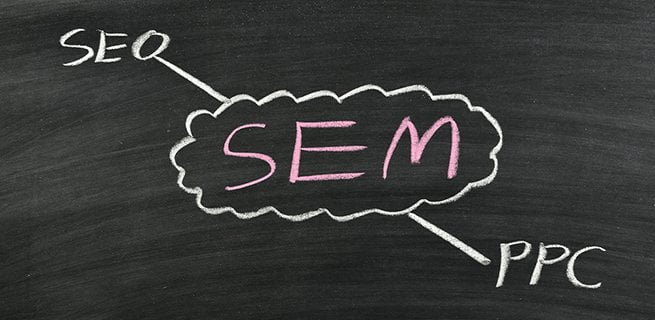Digital Marketing Services
Learn More About Us

When your business is just beginning to invest in online marketing, choosing the ideal format and platform for your campaignA set of ad groups sharing a budget, targeting options, and other settings. can seem difficult. Do you focus on long-term growth using SEO or immediate results from PPC? Do you develop an extensive display campaign or focus on one or two major placementsSpecific websites or locations within websites where ads can appear. at once?
In this guide, we’ll be looking at the benefits and drawbacks of two of the most popular forms of online marketing for small businesses: PPC and SEO.
Technically, PPC (pay-per-click)An online advertising model where advertisers pay a fee each time their ad is clicked. marketing refers to both display advertising (web banners and FacebookA social networking site where users can post comments, share photographs, and links to news or othe... ads) and search marketing. For the purpose of this guide, we will be focusing solely on paid searchAdvertising on search engines, where advertisers pay to have their ads appear in search results. marketing.
Pay-per-click marketing is a massive industry, with businesses spending billions of dollars every year acquiring traffic and maximizing their incoming leads. Thanks to its immense popularity, pay-per-click marketing is incredible competitive and can feel overwhelming for new businesses.
Despite its immense competition, however, PPC can be very rewarding. A successful pay-per-click campaign can be scaled upwards to five, ten, or even twenty times its original size, giving businesses an incredible level of flexibility as to the scale of their campaigns.
The key advantages of pay-per-click marketing are its scale and flexibility – as well as being easy to adjust in terms of scale, pay-per-click campaigns are easy to tweak and modify to achieve the highest possible conversion rateThe percentage of visitors who complete a desired action, such as making a purchase or filling out a.... This means that you’ll probably be able to achieve a higher average conversionThe completion of a desired action by a referred user, such as making a purchase or filling out a fo... rate from PPC than SEO.
Pay-per-click marketing’s downsides are mostly financial. As PPC can be expensive, it’s only a viable option for businesses with a reasonable budget – a budget that, in a worst-case scenario, they are willing to spend acquiring conversion data without a guarantee of profitability.
Other disadvantages of PPC include its limited scope – not all searchers will click on a paid advertisement, limiting its total size. Because of this, many businesses with a successful paid search presence eventually wish to scale their campaigns using SEO strategies and an organically ranked website.
SEO (search engine optimization)The process of improving the visibility of a website on search engines via organic search results. couldn’t be more different from PPC, despite the similar nature of its traffic. While PPC is instant and immediate, SEO is slow-paced and progressive. It’s been said that successful PPC campaigns are like sprinting, and the successful SEO campaigns are far more like running a marathon.
The analogy may seem a little strange, but it’s quite truthful. While a pay-per-click campaign will immediately start generating traffic after it’s launched, SEO can take several months to generate traffic. SEO campaigns aimed at competitive keywordsWords or phrases that users type into search engines to find information. can often take six months or more to start generating any meaningful traffic.
The key advantages of SEO are scale and cost. While SEO campaigns can require a lot of time and effort, they are significantly less expensive to operate than pay-per-click campaigns. This is because traffic from organic search is free, saving you the cost of each click that you would spend as part of a PPC campaign.
Another key advantage of SEO is competition. While SEO is still a highly competitive field, the nature of the competition is different. While a rival business bidding on the same PPC keywords as your own company can outrank you simply by increasing its bid, an SEO rival will need to spend months optimizing its campaign.
This means that, in simple terms, a top-ranked website is more likely to stay at the top over the long term than a top-ranked paid search placement. Of course, this is not a guarantee of lasting success with SEO, as even moderately competitive search keywords can require extensive maintenance and upkeep.
Both PPC and SEO have their advantages, and both are lucrative options for finding an online audience. However, PPC campaigns are more suitable for businesses with a large marketing budget and limited time, while SEO campaigns are more suitable for businesses with a limited marketing budget and large amounts of time.
An established business interested in buying data and building a successful online marketing campaign will benefit most from PPC, whereas a new startup with little cash to spend on advertising will find SEO to be a far more scalable form of online marketing.
Finally, businesses can use both PPC and SEO simultaneously to build a successful long-term campaign. PPC campaigns can be used to discover and confirm the value of new keywords, which are then imported into the SEO campaign as long-term targets with pre-established conversion data and other key metrics.
There you have it – depending on your business’s financial situation and immediate goals, both PPC and SEO can be advantageous. Think carefully about how you would like to achieve your online marketing goals, and you’ll be able to identify the perfect for Los Angeles SEO campaign for your business.
